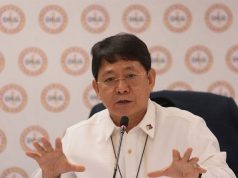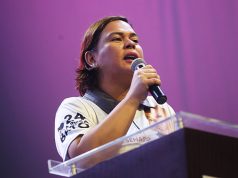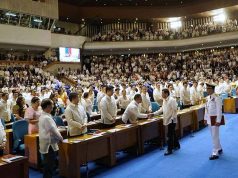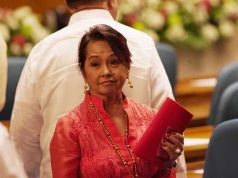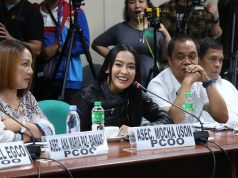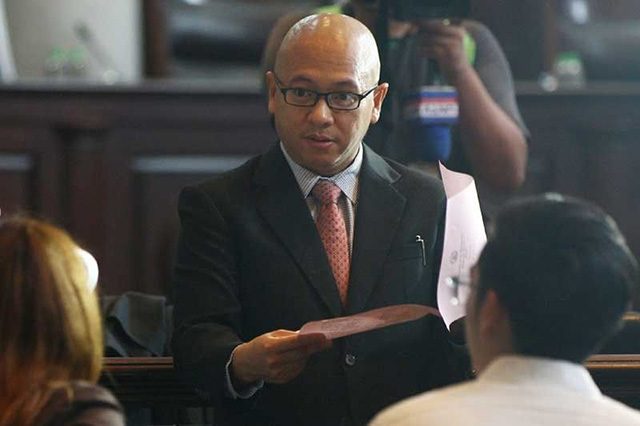
Members of the legal profession have sounded off as the draft federal constitution prepared by the Consultative Committee on charter change was finally made public and drafts have been delivered to the two chambers of congress so that discussions could begin.
Concerns zeroed in on provisions that supposedly give the president broader power in the event of a national emergency and the removal of a ban against reelection of the president and vice-president.
Florin Hilbay
The former solicitor general criticized the draft for transitory provisions that allow the president to assume powers of the three branches of the government and provisions that allow the president to extend his term.
The most impt features of the draft consti of Duterte's consultative committee?
1) The Transitory Provisions, w/c allow the Pres to reorganise & assume ALL powers of gov't.
It allows him to do what he really wants: assume the powers of a revolutionary gov't.
2) Term Extension. pic.twitter.com/G2Vxb58CE9
— florin hilbay (@fthilbay) July 10, 2018
The proposed ARTICLE XXII, Sec.1 on Transitory Provisions provides for the sitting president to be the chairman of the Federal Transition Commission.
Sec.2 of the same article allows the commission to “exercise all powers necessary and proper to ensure a smooth, speedy, and successful transition.”
Meanwhile, Article VIII, Sec.4(a) on the terms of officials in the executive department contains a new feature unseen in the previous constitution: the reelection of the president and vice-president.
The ban against presidential and vice-presidential reelection in the 1987 constitution according to some constitutional scholars was supposedly to discourage long-term monopoly of power.
Mel Sta. Maria
The dean of the Far Eastern University Institute of Law centered his critique on the lack of specific language barring the incumbent president during the transition from future reelection.
The draft constitution states that the incumbent President's term "shall not be extended". But it does not say he is prohibited from being re-elected. A clever use of words. Was this meant to confuse? Extension is lengthening without re-election.
— Mel Sta.Maria (@attymeltweet) July 9, 2018
Sec.6 of the transitory provisions expressly provides for the terms of the incumbent president and vice-president at the time of the transition to end as scheduled on June 30, 2022.
However, nowhere in in the draft is an express prohibition against the same officials to run again in the future.
Sta. Maria also criticized another new feature in the projected new charter: a single vote feature for the presidential and vice-presidential candidates of the same party in future elections.
The new draft constitution deprives the voter of his right to vote a vice-president not allied to the President. A vote of the President will be considered a vote for his Vice-President. In short, walang choice ang botante sa bise.
— Mel Sta.Maria (@attymeltweet) July 9, 2018
Article VI, Sec.4(c) of the proposed constitution decrees that “the President and the Vice President shall be elected as a team.”
A vote for the presidential candidate thus shall also be counted as his vice-presidential running mate, a practice seen in the two-party electoral system of countries such as the United States.
The past two administrations have seen the president serve with a vice-president from another political party: Benigno Aquino III was from the Liberal Party, while Vice-President Jejomar Binay was from the United National Alliance. President Rodrigo Duterte has LP member Leni Robredo as his vice-president.
Antonio La Viña
The veteran environmental and human rights lawyer likewise has observed the use of ambiguous language in the draft.
A professor of constitutional law in a number of law schools, La Viña noted the lack of express prohibition on reelection.
On whether Duterte can run again, whatever intentions of the drafters (and most of them are on the record saying that Duterte can no longer run) does not matter. The text controls; if there is no absolute, explicit ban on who can run under the new constitution, anyone can run.
— Tony La Viña (@tonylavs) July 12, 2018
Not even a ban on reelection is enough; that could be interpreted as applying only to 1987 Constitution positions as nobody is being reelected under the new constitution in its first elections.
— Tony La Viña (@tonylavs) July 12, 2018
La Viña has proposed a number of provisions that could solve the problem of supposedly ambiguous language in the draft.
The only language that is clear enough is this: “No person who served as president under the 1987 Constitution shall be qualified to run and be elected as president under this constitution.
— Tony La Viña (@tonylavs) July 12, 2018
Even better, the new constitution should state Presidents Ramos, Estrada, Arroyo, Aquino, and Duterte are hereby permanently and perpetually disqualified from running and to be elected as President of the Federal Republic of the Philippines.
— Tony La Viña (@tonylavs) July 12, 2018
Jesus Falcis
The young lawyer petitioning for same-sex marriage in the Supreme Court also gave his two cents’ worth on the federal charter.
President Duterte heading the transition commission for our shift to Federalism? No way.
And the approved draft of the Consultative Committee has many provisions concentrating more power in the President. Haven’t we learned from history?#ConsultThePeople pic.twitter.com/gbDLRX6bYd
— Jesus Falcis ? (@jesusfalcis) July 4, 2018
Warning against a supposed ‘concentration of power’ in the president granted by the new constitution, Falcis highlighted provisions in Article XIX, Sec. 10 on national security and public order and Article XX, Sec.4 on general provisions.
Under Article XIX, the president is directed to “take all necessary actions to repel and quell the attack” in the event of a cyber security threat to the country.
Article XX on the one hand allows the president to “intervene and take all measures necessary and proper” should any region “fail to comply with its obligation, as provided for in the Constitution, which seriously undermines the sovereignty, territorial integrity, economy, or the unity of the Federal Republic.”
The provision on cyber security is the first time such a threat has been contemplated in the constitution.
On the one hand, the provision in Article XX is the first such grant of power that contemplates a region of the Philippines failing to govern itself.
These two new features will be placed alongside security and peacekeeping provisions already in the current constitution.
The federal charter has preserved the ‘calling-out power’ in the 1987 Constitution that allowed the president as commander-in-chief to call out the armed forces, as well as the power to declare martial law and suspend the privilege of the writ of habeas corpus in the event of lawless violence, invasion, or rebellion.
James Jimenez
Commission on Elections Spokesperson James Jimenez shared his personal observations on the draft through a column he posted on Twitter.
I got a look at the draft Constitution (which the Consultative Committee disavowed). Obvsly, I'd have an opinion (which are mine alone, btw, and do NOT reflect any position of @COMELEC) on the provisions related to my sphere of professional interest.https://t.co/HDdJcWr4vx pic.twitter.com/ICqYognzzM
— James Jimenez (@jabjimenez) July 5, 2018
Among the things he discussed were how the draft constitution called for a ‘centralized Federal COMELEC.’
Article X-C. titled “FEDERAL COMMISSION ON ELECTIONS” introduced a new requirement for the COMELEC: commissioners allocated among the three main island groups.
The proposed Article X-C. also calls for “two (2) from Luzon, two (2) from Visayas, and two (2) from Mindanao one of whom shall represent the Bangsamoro.”
Another revision underscored by Jimenez is how the requirement that majority of the commissioners be members of the bar.
The proposed replacement provision now calls for at least just one member of the commission to be a member of the bar.




